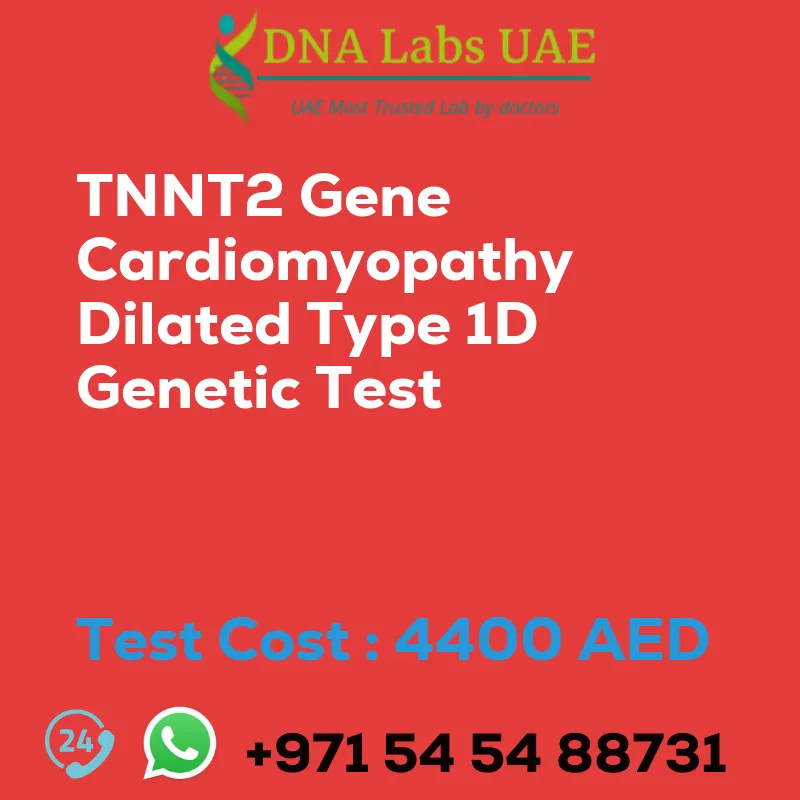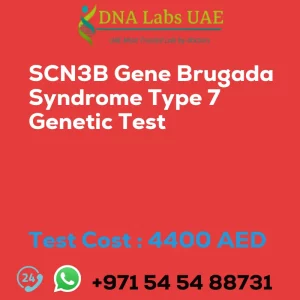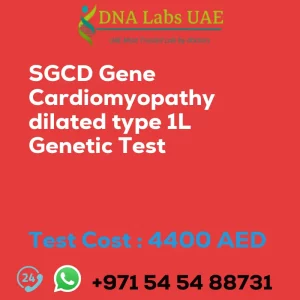TNNT2 Gene Cardiomyopathy Dilated Type 1D Genetic Test
Test Name: TNNT2 Gene Cardiomyopathy Dilated Type 1D Genetic Test
Components: Blood or Extracted DNA or One drop Blood on FTA Card
Price: 4400.0 AED
Report Delivery: 3 to 4 Weeks
Method: NGS Technology
Test Type: Cardiovascular Pneumology Disorders
Doctor: Cardiologist
Test Department: Genetics
Pre Test Information: Clinical History of Patient who is going for TNNT2 Gene Cardiomyopathy, dilated type 1D NGS Genetic DNA Test. A Genetic Counselling session to draw a pedigree chart of family members affected with TNNT2 Gene Cardiomyopathy, dilated type 1D NGS Genetic DNA Test gene TNNT2
Test Details
TNNT2 gene cardiomyopathy, dilated type 1D is a genetic condition that affects the heart muscle. It is characterized by the dilation and weakening of the heart, leading to decreased pumping ability and potentially causing heart failure.
NGS (Next-Generation Sequencing) genetic testing is a diagnostic test used to identify genetic mutations in an individual’s DNA. In the case of TNNT2 gene cardiomyopathy, dilated type 1D, NGS genetic testing can be used to analyze the TNNT2 gene for any mutations or variations that may be associated with the condition.
The TNNT2 gene provides instructions for making a protein called cardiac troponin T, which is involved in the regulation of muscle contraction in the heart. Mutations in the TNNT2 gene can disrupt the normal function of cardiac troponin T, leading to the development of cardiomyopathy.
NGS genetic testing for TNNT2 gene cardiomyopathy, dilated type 1D involves obtaining a DNA sample, typically through a blood sample or cheek swab. The DNA is then sequenced using advanced sequencing technologies, allowing for the detection of any mutations or variations in the TNNT2 gene.
The results of the NGS genetic test can help diagnose TNNT2 gene cardiomyopathy, dilated type 1D in individuals with symptoms or a family history of the condition. It can also be used for carrier testing in individuals with a family history of the condition but no symptoms.
Genetic testing can provide valuable information for individuals and their families, including guidance for medical management, family planning, and genetic counseling. It is important to consult with a healthcare professional or genetic counselor to understand the implications of the test results and to discuss any further steps or recommendations.
| Test Name | TNNT2 Gene Cardiomyopathy dilated type 1D Genetic Test |
|---|---|
| Components | |
| Price | 4400.0 AED |
| Sample Condition | Blood or Extracted DNA or One drop Blood on FTA Card |
| Report Delivery | 3 to 4 Weeks |
| Method | NGS Technology |
| Test type | Cardiovascular Pneumology Disorders |
| Doctor | Cardiologist |
| Test Department: | Genetics |
| Pre Test Information | Clinical History of Patient who is going for TNNT2 Gene Cardiomyopathy, dilated type 1D NGS Genetic DNA Test. A Genetic Counselling session to draw a pedigree chart of family members affected with TNNT2 Gene Cardiomyopathy, dilated type 1D NGS Genetic DNA Test gene TNNT2 |
| Test Details |
TNNT2 gene cardiomyopathy, dilated type 1D is a genetic condition that affects the heart muscle. It is characterized by the dilation and weakening of the heart, leading to decreased pumping ability and potentially causing heart failure. NGS (Next-Generation Sequencing) genetic testing is a diagnostic test used to identify genetic mutations in an individual’s DNA. In the case of TNNT2 gene cardiomyopathy, dilated type 1D, NGS genetic testing can be used to analyze the TNNT2 gene for any mutations or variations that may be associated with the condition. The TNNT2 gene provides instructions for making a protein called cardiac troponin T, which is involved in the regulation of muscle contraction in the heart. Mutations in the TNNT2 gene can disrupt the normal function of cardiac troponin T, leading to the development of cardiomyopathy. NGS genetic testing for TNNT2 gene cardiomyopathy, dilated type 1D involves obtaining a DNA sample, typically through a blood sample or cheek swab. The DNA is then sequenced using advanced sequencing technologies, allowing for the detection of any mutations or variations in the TNNT2 gene. The results of the NGS genetic test can help diagnose TNNT2 gene cardiomyopathy, dilated type 1D in individuals with symptoms or a family history of the condition. It can also be used for carrier testing in individuals with a family history of the condition but no symptoms. Genetic testing can provide valuable information for individuals and their families, including guidance for medical management, family planning, and genetic counseling. It is important to consult with a healthcare professional or genetic counselor to understand the implications of the test results and to discuss any further steps or recommendations. |








